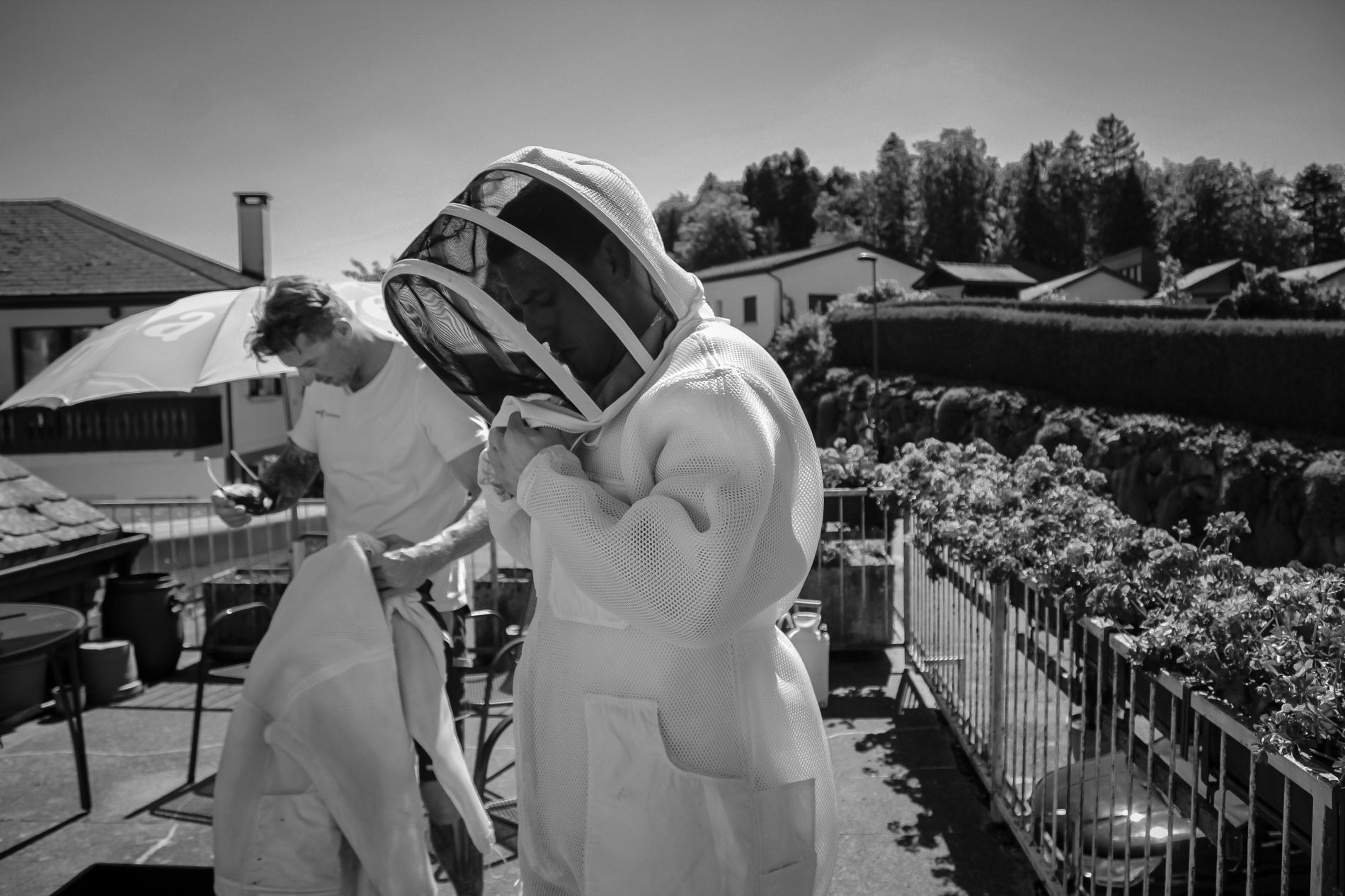
Fighting Asian hornets in Bösingen
Have you discovered an Asian hornet's nest? We'll be on site quickly! Call now - Daily Mon-Sun 07:00-21:30. Contact us now: 058 510 22 54
Having the Asian hornet's nest removed
Originating in South-East Asia, the hornet species Vespa velutina has aggressively extended its reach to Switzerland and the surrounding subcontinent. While it does not exhibit hostility towards humans, it is infamous for its hunting of honey bees, causing alarm among beekeepers. Only a few of these hornets can swiftly attack and eradicate a colony of bees in just a few hours. If you have discovered a hornet's nest on your house, patio, shed, or in your blind box, contact our experts for hornet nest removal in Bösingen!
Use the uncomplicated telephone service of the Hornet experts in Bösingen and simply inform us at 058 510 22 54, we will be on site quickly so that you and everyone in your area feel completely safe again.
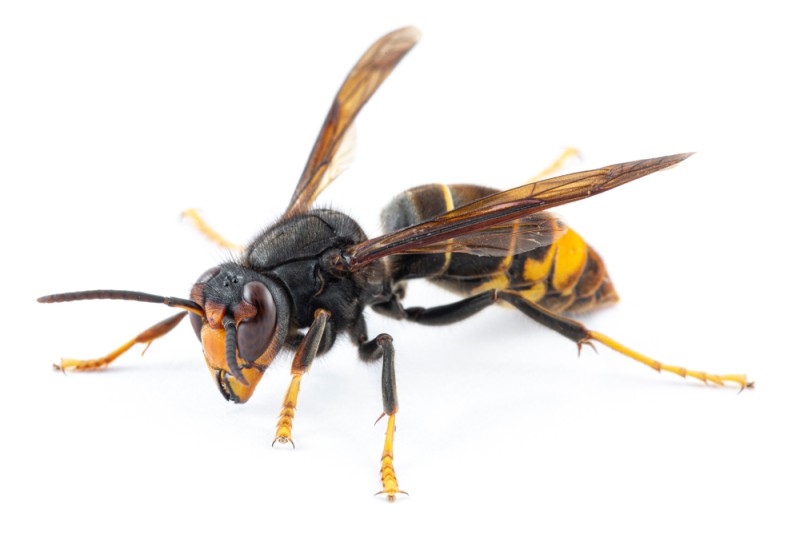

Appearance of the Asian hornet
Here are some characteristics that distinguish the Asian hornet:
1. Size: The queen can reach a length of about 3 cm, while the workers are slightly smaller and measure about 2.5 cm.
2. Color: The Asian hornet has a dark body that is almost black, with a yellow stripe at the back of the abdomen. Its face is orange-yellow.
3. Wings: The wings are dark and almost smoky gray.
4. Legs: The hornet has yellow tips on its legs, which is a striking distinguishing feature when it flies.
5. Nest: The Asian hornet's nest is often high in the trees, but it can also be found underground or in tall structures such as chimneys. It has an oval shape and is made of chewed wood, which gives the hornet a papery texture.
It is important to distinguish the Asian hornet from the European hornet (Vespa crabro), which is more harmless and a natural part of the European fauna. If you suspect you have found an Asian hornet nest near you in Bösingen, you should report this to the local authorities, or using our reporting form, as they can spread quickly and be harmful to bees and other insects. To avoid being attacked by the flying inhabitants, you should hire a professional pest controller such as the Hornet Experts Bösingen. We can identify the nest beyond doubt and take further steps to remove the Asian hornets professionally.
News about the Asian hornet in Bösingen
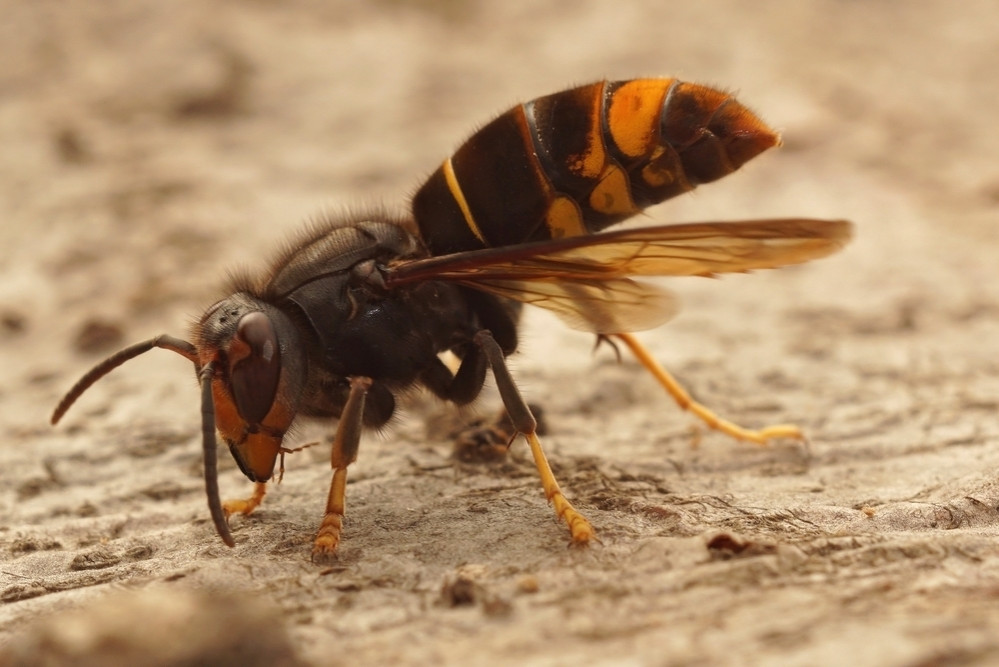
02.12.2025 Western Switzerland: Killer hornet eats bees
The territory of the Asian killer hornet has expanded considerably this year, with a notable increase reported in western Switzerland. This invasive species poses a significant threat to native bee populations, as bees make up the majority of its diet. The potential consequences are serious. Moreover, the hornet represents a danger to individuals with allergies to its venom.
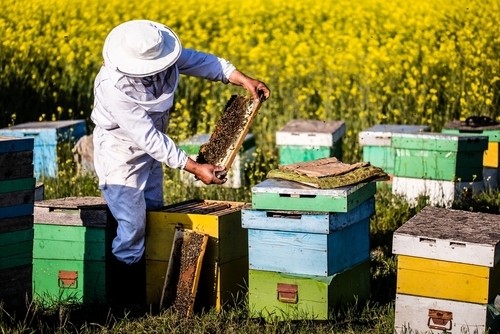
25.11.2025 Serious concerns about the bee population!
Asian hornets are inflicting significant harm on beehives across multiple parts of Europe, as reported by local beekeepers. Even a small number of hornets can destroy an entire bee colony within hours. This sharp decline in pollinators could have serious consequences for pollination, local ecosystems, and agricultural productivity.
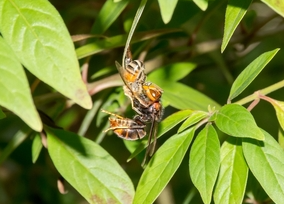
18.11.2025 Asian hornet doesn't just eat bees!
The danger it presents to insects is substantial!
The Asian hornet feeds largely on honeybees—up to 85 percent of its diet—alongside beetles and flies. This high level of predation not only poses difficulties for fruit growers but also further threatens already vulnerable bee populations.
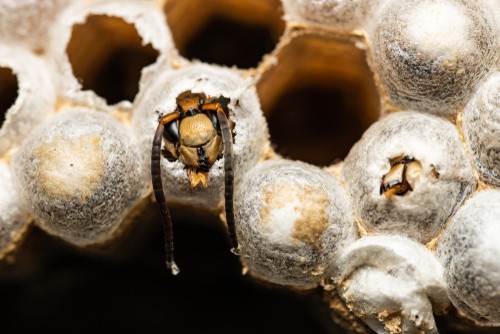
11.11.2025 How did the Asian hornet get to Europe?
The Asian hornet likely arrived in Europe unintentionally and has quickly expanded throughout France and nearby countries. Its adaptability to different environments and the absence of natural predators have contributed to its rapid spread. A single nest can generate several hundred new queens in one breeding season.
Asian Hornet Reporting Form
Please fill out all required fields and submit the form.
Help us!
If you discover an Asian hornet or a nest of this invasive species in Bösingen, it is of the utmost importance that you report it immediately. The Asian hornet is not only dangerous to humans, but also poses a serious threat to native bee populations and the ecological balance in Switzerland.
Why is it important to report the find?
Native insects, especially honey bees, face substantial challenges when the Asian hornet establishes itself in particular regions. By preying on bees, these hornets cause a decline in pollinator populations, leading to adverse effects on local flora and agricultural output. By reporting sightings, experts can react quickly, remove the hornets or their nests and thus prevent the spread of this invasive species.
Notification form for sightings
By regulating the overpopulation of Asian hornets in Switzerland, we can protect our native insects. We urge you to report any suspicions or sightings using our specialized reporting form. With your help, we can intervene early and minimize the impact of this dangerous species on our ecosystems.
Your contribution is crucial in the fight against the Asian hornet in Bösingen. Together we can protect nature and maintain the balance of our ecosystems;
Thank you for your vigilant attention and your commitment to protecting our environment.
How dangerous is the Asian hornet?
The Asian hornet (Vespa velutina) is a predatory insect that originated in Asia and has spread in recent years to various parts of Europe, including France and now also Switzerland and in Bösingen. Although it poses a threat to honey bees and native biodiversity, it is generally no more dangerous to humans than other wasp species. Nevertheless, there are some aspects to be aware of:
1. Threat to honey bees: The Asian hornet preys on honey bees, threatening native bee populations. A decline in bees can have a negative impact on pollination and thus on local flora and agricultural production.
2. Stings: As with other wasp and hornet species, the stings of the Asian hornet can also be painful. For most people, the stings are unpleasant but not dangerous. However, people who are allergic to wasp or hornet stings can suffer a severe allergic reaction, which in the worst case can lead to anaphylactic shock.
3. Aggressiveness: Although the Asian hornet is not necessarily more aggressive towards humans than other wasp species, it can become aggressive if it feels threatened, especially near its nest.
4. Ecological effects: Apart from the direct effects on honey bees, the spread of the Asian hornet can also disturb the ecological balance by affecting the populations of other insects.
It is critical to recognize that the Asian hornet and the Asian giant hornet (*Vespa mandarinia*) are distinct insects. Avoid confusing the Asian hornet with the much larger Asian giant hornet, known as the "killer hornet". The giant hornet has the potential to be more dangerous to humans due to its more powerful venom and the larger size of its sting.
If you have discovered a nest, call us immediately: 058 510 22 54
Our hornet professionals in Bösingen are certified by the VSS.
Frequently Asked Questions About Asian Hornets in Bösingen
The Asian hornet is significantly more hazardous than most other hornet species due to its ability to deliver stings that can cause serious harm and possible fatality, highlighting the gravity of its danger.
Featuring an imposing size, the Asian hornet can measure up to 3 cm in length. Its sleek, onyx form is adorned with a dense coating of vivid orange, yellow, and black stripes.
To humans, the Asian hornet is highly poisonous. Its bite can induce intense pain and lead to allergic reactions, necessitating caution and appropriate measures for safety.
Humans face tremendous danger from the Asian hornet's venomous bite, which can cause excruciating pain and incite allergic reactions.
The Asian hornet's venom-filled sting makes it dangerous, posing a threat to humans. Its sting surpasses that of other wasps in both pain intensity and the potential for allergic reactions.
The proper procedure for reporting an Asian hornet involves reaching out to either a local officer responsible for preserving wild bees or the designated department within the Ministry of Agriculture.
It is crucial to report Asian hornets in order to avoid attacks and hinder the expansion of the insect. These particular insects display a strong territorial instinct and aggressive tendencies.
In Switzerland, professional hornet control becomes necessary when Asian hornets are present. It is advisable to call a trusted pest control service provider for efficient resolution.
While the Asian hornet is not officially protected, it is imperative to conduct thorough monitoring to hinder their potential for further dissemination.
While hibernating, the Asian hornet demonstrates either communal behavior or a preference for solitude, occupying spaces in the corner regions of walls, buildings, garden sheds, occasional houses, or tree hollows.
Would you like more information about Asian hornets? Then take a look at our FAQ's about Asian hornets.
Private inquiry form
For an uncomplicated request to remove an Asian hornet's nest, please use our contact form for private individuals.
Real estate inquiry form
Use our property management order form to request the removal of an Asian hornet's nest.




_3.jpeg)
_3.jpeg)
_3.jpeg)
_3.jpeg)